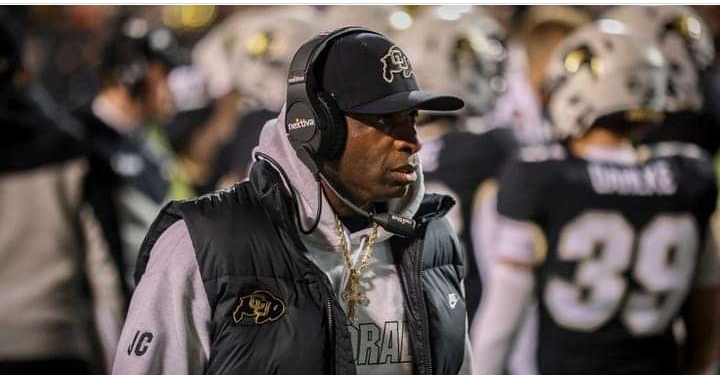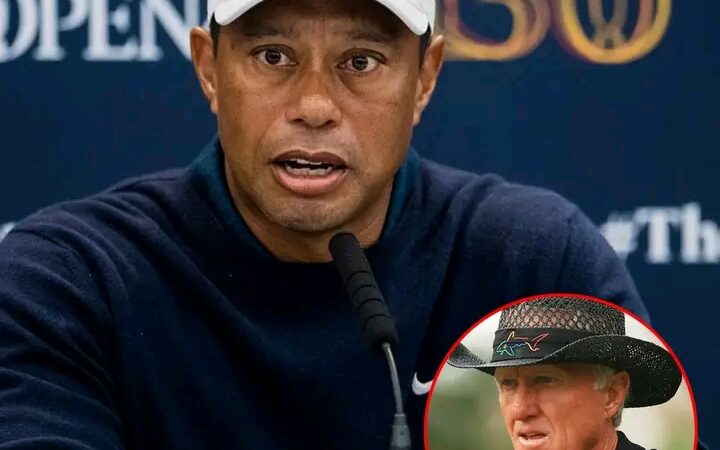Deion Sanders explains staff shakeup

Colorado football coach Deion Sanders did what he felt was necessary this week, even if it felt a little desperate.
After losing four of their last five games, he revamped his coaching staff and brought in a former NFL head coach to get the best out of his star quarterback son.
But it did not work.
In fact, on Saturday, the Buffaloes fared even worse against the no. 19 Oregon State, missing just two shots, 26-19.
Colorado’s Sheder Sanders drew national attention as the Buffs got off to a 3-0 start, but had to take a painkiller shot to finish the game as they fell to 4-5 on the season.
“It’s a tough one,” Dion Sanders said later.
“The reason it’s so hard is because I know you can do better.
You can play better, do better, play better games, coach better for me. And if you’re good enough to – you’re doing your job, it’s missing.
And it hurts.
“It hurt not only me, but the team, the coaches and the fans.”
Before the break it was clear that coaching mistakes were having an impact on the game.
Deion Sanders took the blame for it.
However, the Buffs still struggled to protect their quarterback in the first three quarters as the quarterback went to the locker room to take painkillers.
He later said he was “pissed off” and nearly brought his team back from a 23-5 deficit in the fourth quarter in front of a sold-out crowd at Folsom Field (52,725).
What else did Deion Sanders say?
He explained why he hired former New York Giants and Cleveland Browns coach Pat Shurmur to replace offensive coordinator Sean Lewis.
Shurmur was paid $50,000 a year behind the scenes as an analyst at Colorado State University, according to a copy of the appointment letter obtained by USA TODAY Sports.
But after the big change, he is now one of 10 full-time coaches on the team and will take over the co-offensive coordinator role alongside Lewis, who left his head coaching job at Kent State last year to lead the Colorado’s $850,000. this year.
“We don’t blame Shawn Lewis,” Deion Sanders said when asked about Shurmur starting over Lewis.
“We don’t do that.
We don’t accept that tone.
Sean is a good guy. I think he’s good at phones.
At that time I needed a change.
At that point we had to try something different and we did.
I do not see. I don’t doubt it at all.
Because it’s more than you know.
Deion Sanders said the play-calling system is “still a group effort” and that both Lewis and Shurmur are “really talented.”
“One person makes it right, one person makes it bad,” he said.
Before Saturday, the Buffs ranked second nationally in sacks allowed with 42, a year after finishing the season with a 1-11 record. They also have the third-worst rushing attack in the country at 78.6 yards per game.
On Saturday, Schaeder Sanders was sacked four more times and held his team to minus-7 rushing yards on 19 carries.
What happened in the game?
Despite the coaching staff reorganization, the offensive linemen on the field remained unchanged, with Sheeder playing porous defense for Sanders.
Down 14-3, the Buffs had just 52 yards of total offense on 30 plays before halftime. They also punted five times in their first seven possessions, fumbled on another possession and made a 32-yard field goal for their only score.
The latter occurred after Colorado safety Shiloh Sanders forced an offensive possession on the Buffs at the Oregon State 19-yard line.
As the team entered the locker room at halftime, Sheder Sanders was seen limping and Deion Sanders committed a strategic error that led to an Oregon touchdown with 16 seconds left in the second quarter.
“It’s up to me,” Deion Sanders said on ESPN at halftime.
What happened?
Colorado took over at their own 4-yard line with 49 seconds left in the first half, leading 7-3.
Had the Buffs controlled the ball and the clock, they would have scored at halftime.
Instead, Schaeder was positioned as if Sanders was going to drive the length of the field to score.
He attempted two incomplete passes on first and second downs, but failed to complete a third down, ultimately forcing the Beavers to call one of two timeouts with 36 seconds remaining.
Colorado picked up a fourth down and set up a quick score for the Beavers before the end of the first half.
Why didn’t the Buffs run the clock and give the ball to the Beavers?
“We wanted to come out in the second half because we knew we were going to get the ball,” Deion Sanders said.
“So the plan was to get the first down and let it go, and if that didn’t work out, if we didn’t get it right from the start, well, let’s bide our time.”
This did not happen. Oregon returned the ball 28 yards to the Colorado 20-yard line with 21 seconds left.
One play later, Oregon quarterback DJ Waiagalelei threw the ball down the right sideline and ran for a 20-yard touchdown pass to Deshaun Fenwick with 16 seconds left in the first half.
That stop ultimately changed the game.
Instead of trailing 7-3 at halftime, the Buffs went on a 14-3 run.
“You know, it was huge in a lot of ways,” Oregon coach Jonathan Smith said.
Deion Sanders knew that.
“He could have beaten him.
It’s crazy,” he said.
“It hurt a lot.”
Oregon State’s momentum continued in the second half.
The Beavers went 85 yards in 12 plays on their opening drive, capped by a 1-yard run by Wyagalelei to take a 20-3 lead.
What happened after the game ended?
Sheder Sanders went into the locker room to take painkillers about 3 minutes into the third quarter.
He didn’t miss a beat down the field and returned to lead the team on the Buffs’ final two possessions of the game.
Their first touchdown was a 15-yard pass from Sheder Sanders to two-time star Travis Hunter that helped cut Oregon’s lead to 23-12 with 10:41 remaining.
Colorado recorded its 11th possession in seven games and one loss before that.
“I’m just upset,” Sheder Sanders said.
“This is.”
He said he never considered leaving the game because “the pain of not being together was greater” than the pain his body felt. On the next possession, he led the Buffs back down the field, capping a nine-play, 12-yard pass to Anthony Hankerson with 1:42 left.
But it’s too little, too late.
He then said, “Overall I liked it,” though he downplayed the change in player numbers.
The Beavers (7-2) outgained the Buffs 418-238.
160 of Colorado’s 238 yards came in the fourth quarter.
Scheder Sanders completed 24 of 39 passes for 245 yards and two touchdowns.
Waiagalelei was 12 of 24 for 223 yards and a touchdown.
What’s next for Deion Sanders and Colorado?
Deion Sanders said his team lacks the “passion” it had earlier in the season.
But as his team enters its final three games of the regular season, starting with next week’s home finale against Arizona, he finds hope.
Two wins are needed to advance to the postseason.
“Our kids fought hard,” he said.
“They really did.
I really like how they didn’t give up and stayed together until the end and put in a great effort.
“We want to be able to do that in the middle of the game.”
Regardless of who makes the decision, his offensive line remains the same. On the other hand, he still fears Shedeu. On Saturday he showed once again that he can carry the team at the back, at least as much as possible.
“That kid is tough.” said his father.
“That guy is tough.
Fight it and make no excuses.
He wasn’t raised that way. We make no apologies.
We don’t do that.”
What else has Deion Sanders done for his employees?
To make room for Shurmur on a coaching staff limited to 10 by NCAA rules, Sanders had to fire the current assistant coach and demote him to an analyst role. Colorado coach Tim Brewster rejected the move, but Sanders said he won’t because “everybody makes the same amount of money.” Brewster, a former Minnesota head coach, will make $400,000 this year at Colorado State.
Colorado only had one tight end available, making Brewster a logical candidate to move to the analyst position.
“This is the action we need to take,” Dion Sanders said.






